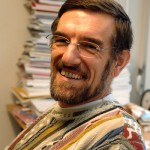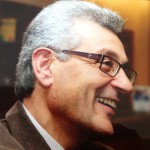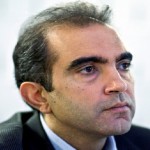External Professors of the Second Summer School
 Professor Anne Cazemajou
Professor Anne Cazemajou
ACTé, Blaise Pascal University, Clermont University, France
Anne Cazemajou has a PhD in anthropology and is a certified trainer in elicitation techniques, under the direction of Pierre Vermersch / GREX (Research group in elicitation).
She gives beginners and advanced training in elicitation in both English and French, as well as in auto-elicitation, learning to learn sessions, elicitation and VAE (Validation of Acquired Experience), analysis of practice and reflexive practice.She intervenes in diverse contexts including businesses, management and training institutions, universities and so on. Her fields of expertise include the transmission of know-how; learning to learn; the detection, valorisation, development and acquisition of competences (skills); research methodology; support for creativity and change.
Professor Fons Van de Vijver
Tilburg University, the Netherlands – North-West University, South Africa
Fons van de Vijver (1952) has studied psychology at Tilburg University in the Netherlands. He holds a Ph.D. from the same university. He holds a chair in cross-cultural psychology at Tilburg University, the Netherlands and an extraordinary chair at North-West University, South Africa, and the University of Queensland, Australia.
He has (co-)authored over 400 publications, mainly in the domain of cross-cultural psychology. The main topics in his research involve bias and equivalence, psychological acculturation and multiculturalism, cognitive similarities and differences, response styles, translations and adaptations. He is or has been supervising about 35 PhD studies and 5 post-doc studies. He has teaching experience in cross-cultural psychology and methods/statistics. He has presented keynotes and invited lectures at various conferences and workshops in various countries. He is one of the most frequently cited cross-cultural psychologists in Europe.
He has received grants from various Dutch institutions (such as NWO and WOTRO), European Union (Marie Curie), South African Netherlands Research Programme on Alternatives in Development, and South African National Research Foundation. He is member of the following professional organizations: International Association for Cross-Cultural Psychology, International Association of Applied Psychology, European Association of Psychological Assessment, International Academy for Intercultural Research, and the International Test Commission. He is the former editor of the Journal of Cross-Cultural Psychology, and serves on the board of various journals; he has evaluated manuscripts for about 110 journals as ad-hoc reviewer.
He has been vice-dean for research and vice-dean for education of his faculty and vice-director of Babylon, the interdisciplinary research center for studies of multicultural societies at Tilburg University. He is a former president of Division 2 (Assessment and Evaluation) of the International Association of Applied Psychology and is now President of the European Association of Psychological Assessment and President-Elect of the International Association for Cross-Cultural Psychology.
He is the 2013 recipient of the International Award of the American Psychological Association (for his contributions to international cooperation and to the advancement of knowledge of psychology) and the 2014 recipient of the IAAP Fellows Award (of the International Association of Applied Psychology for contributions to applied psychology) and the 2014 Sindbad Award of the Dutch Psychological Association (for his contributions to intercultural psychology).(ISI) h-index = 25; (Google Scholar) h-index = 54; g index = 101; i10 index = 140
Webpages:
http://www.fonsvandevijver.org
http://www.tilburguniversity.edu/webwijs/show/?uid=fons.vandevijver
http://www.psy.uq.edu.au/directory/index.html?id=1955
http://www.researchgate.net/profile/Fons_Van_de_Vijver/
Professor Ronald G. Sultana
University of Malta
Ronald G. Sultana studied career guidance at the University of Reading (UK), and researched career education and transition-to-work issues at the Universities of Waikato (New Zealand), and Stanford (USA), where he was a Fulbright Fellow. He is professor of sociology and comparative education at the University of Malta, where he directs the Euro-Mediterranean Centre for Educational Research. He has participated as a consulting expert in several international reviews of career guidance, including those led by the European Training Foundation and CEDEFOP. His most recent research has focused on comparative analyses of career guidance across Europe, and in the Middle East and North Africa region, and he uses a range of theoretical lenses to consider the impact of neo-liberalism and globalization on life trajectories in different contexts. Professor Sultana is a Fellow of the National Institute for Career Education & Counselling (NICEC-UK). He has served as consulting expert to the European Lifelong Guidance Policy Network, as well as on the editorial board of the British Journal of Guidance and Counselling, and the Journal of Education and Work. A list of his publications is available at: http://www.um.edu.mt/emcer Email: ronald.sultana@um.edu.mt
 Professor Patrick Werquin
Professor Patrick Werquin
CNAM (Conservatoire national des arts et métiers – French Tertiary C-VET and Research Institution), Paris
Patrick Werquin is currently Professor at CNAM (Conservatoire national des arts et métiers – French Tertiary C-VET and Research Institution), Paris, and international independent consultant based in Saint-Sulpice-sur-Lèze (France) and Bonn (Germany). He has been working, among others, with AFD, dvv International, Ecorys, IDB, I&D, the European Commission, GHK Consulting, GIZ, LuxDev, SAQA, the UNESCO (Section for VET), and several national ministries and organisations; in more than 40 countries.
He was senior economist with the Organisation for Economic Co-operation and Development (OECD), Directorate for Education (Education and Training Policy Division) and CERI (Centre for Educational Research and Innovation) from 1999 to 2011. He was a researcher at the French Centre for Research on Education, Training and Employment (Céreq, 1992-99). He has a PhD in Economics and taught Economics, Statistics and Econometrics at the Université de la Méditerranée (Aix-en-Provence and Marseilles, 1986-98) and at the École des hautes études en sciences sociales (EHESS, 1986-1998). He taught Economics of Education at the University of Neuchâtel, Switzerland (2006-09), and has supervised PhD students in Canada, France and Morocco.
Patrick Werquin is working and publishing on lifelong learning, technical and vocational education and training (TVET), national qualifications systems and frameworks, literacy, adult learning, low skilled individuals/workers, adult literacy, new competences and assessment of adult skills, school-to-work transition, validation and recognition of non-formal and informal learning outcomes, credit transfer, statistical indicators and large scale statistical surveys for education and the labour market, as well as human capital and business climate in Mediterranean MENA countries; in all OECD countries as well as in many countries in Africa, the Caribbean, North and Latin America, Europe and South East Asia.
He was the OECD contact person for the International Adult Literacy Survey (IALS) and the Adult Literacy and Life Skills Survey (ALL). He was involved in the launching of the PIAAC survey (Programme for International Assessment of Adult Competencies). He contributed to the following OECD publications: the third IALS report (Literacy in the Information Age, 2000), the 2001 Education Policy Analysis (prepared for the meeting of the Education Committee at the ministerial level), the two reports of the Thematic Review of Adult Learning (Beyond Rhetoric: Adult Learning Policies and Practices, 2003; Promoting Adult Learning, 2005), the first ALL report (Learning a Living, 2005). He is the co-author of the OECD publication: Qualifications Systems: Bridges to Lifelong Learning (2007) and the author of the OECD publications: Recognising Non-formal and Informal Learning: Outcomes, Policies and Practices (2010) and Recognition of Non-formal and Informal Learning: Country Practices (2010).
Professor Borhéne Chakroun
Borhène Chakroun is an engineer and has a PhD in Education Sciences from Bourgogne University in France. His academic work focuses on the certification and validation of prior learning. Borhene worked, during the 1990s, as trainer, chief trainer, VET project manager. He has also worked as short-term consultant for the EU, World Bank and other international organisations before coming to the European Training Foundation (ETF) in 2001. At the ETF, Borhène worked as Senior Human Capital Development specialist and Team leader of the EU funded regional project Education and training for Employment in MENA region (MEDA-ETE). He has also coordinated the ETF’s community of practice on National Qualifications Frameworks and Recognition of Qualifications. He is now Head of the section in charge of TVET at UNESCO and is leading the implementation of the UNESCO TVET strategy adopted in 2009.
 Professor Sobhi Tawil
Professor Sobhi Tawil
Sobhi Tawil joined UNESCO in 2002 after a career with diverse institutions and organizations including the International Committee of the Red Cross (ICRC), the Graduate Institute for International and Development Studies (Geneva), the Network of International Policies and Cooperation in Education and Training (NORRAG), as well as the International Institute for Higher Education (Rabat). He has experience in education policy analysis, research in basic education and development, planning, curriculum reform, as well as in conflict and social cohesion. Within UNESCO, Sobhi Tawil initially worked as head of the Capacity Building Programme for Curriculum Development at the International Bureau of Education (IBE) in Geneva, as Education Programme Specialist at the Rabat Cluster Office (2005-2010), and as Chief of the Education Policy Analysis and Strategies Section (2010). Since January 2011, Sobhi Tawil is Senior Programme Specialist for Education Research and Foresight.



